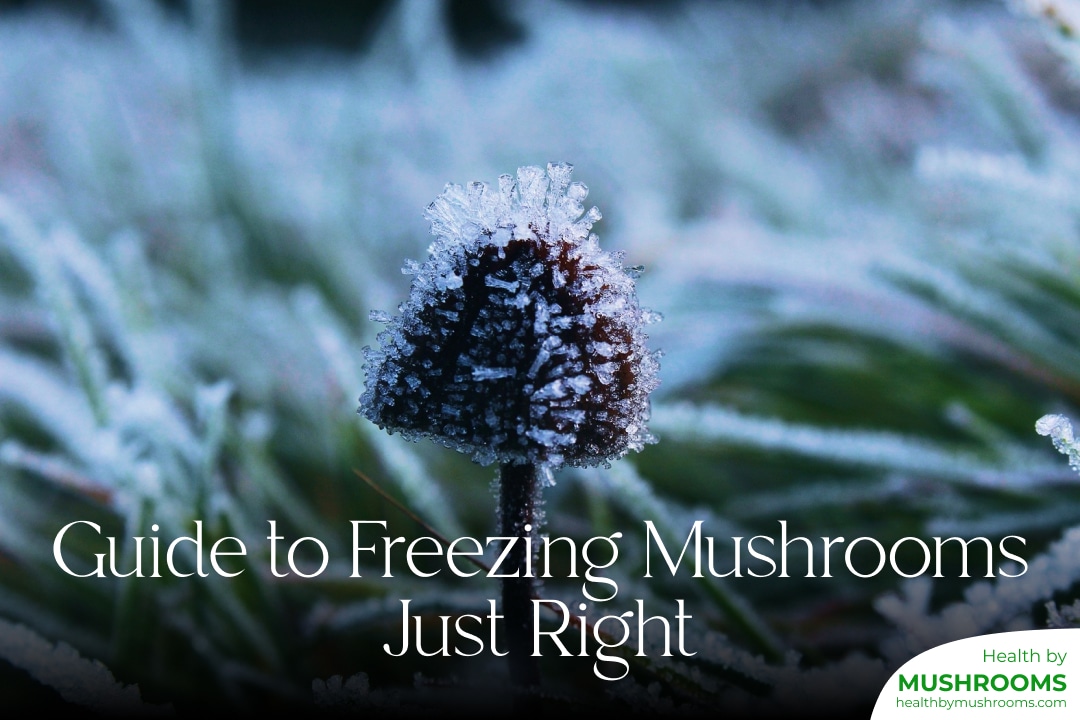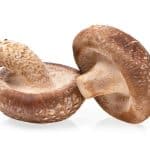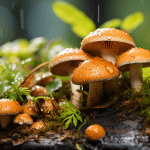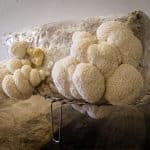Mushrooms are like little flavor powerhouses, packed with earthy goodness that can take your dishes to the next level. They’re also full of all sorts of healthy micronutrients.
But can you freeze mushrooms? Are those mushrooms’ health benefits going to be lost in the freezer? Or do you put them in the fridge, not the freezer? It’s a way more complex thing than one could imagine!
The Short Answer
Yes, you can freeze mushrooms: in the freezer, not the fridge, if you want to keep them frozen for a few weeks or months. Reserve the fridge for a day or two.
Some mushrooms are better at staying fresh after freezing than others! You should not freeze oyster mushrooms and enoki, those two are too delicate for it.
In fact, most mushrooms SHOULD be frozen as soon as possible after picking, since this will keep their flavor and nutritional value. If you freeze shriveled and dried out mushrooms that are a day or two away from going rancid, they’ll taste the same when you defrost them.
It’s much better to freeze mushrooms fresh. Freezing them before cooking helps preserve their natural qualities, as cooking them before freezing can affect their texture and flavor. So, freeze ’em fresh for the best results.
And keep them air tight: the National Center for Home Food Preservation recommends to seal your shrooms before freezing.
Diving Into Details
Now, let’s make it clear: you can freeze everything, and you definitely can freeze mushrooms. What matters is, whether it’s going to be OK when you get it back from the fridge or your freezer. And with mushrooms, it’s pretty simple:
Mushrooms don’t lose much in terms of taste or nutrients when frozen.
Those little guys can stay nicely preserved in the freezer for several months. Just make sure to store them properly in airtight containers or freezer bags to avoid freezer burn or moisture loss.
Freezing Mushrooms Short-term or Long-term?
If you’re thinking long term, freezing mushrooms is your best bet. Properly stored in the freezer, they can stay tasty for 3-6 months. Just follow the steps mentioned earlier: clean, slice (if desired), arrange on a tray, flash freeze, and then transfer to airtight containers or freezer bags.
How long do mushrooms last in the fridge?
In the fridge, fresh mushrooms can last a good 7-10 days if stored correctly. Keep ’em dry by storing them in a paper bag or a container lined with paper towels to absorb any excess moisture. Stick ’em in the fridge’s main compartment, preferably in the crisper drawer, for optimal storage.
When properly stored in the freezer, mushrooms can stay delicious for around 3-6 months without losing much quality. Just make sure to label the containers with the freezing date, so you can keep track of their freshness.
Also, if you blanch mushrooms a little before you freeze them, as Couple Cooks suggests, you’ll get a better result in the end.
Are there any types of mushrooms you can’t freeze?
Most commonly used mushrooms freeze well. We’re talking:
- Button;
- Portobello;
- Cremini;
- Shiitake;
- And others.
However, delicate mushrooms such as Enoki or Oyster mushrooms may not fare as brilliantly in the freezer. They can become mushy or develop an unpleasant texture after thawing. Stick to the sturdier ones for freezing.
Can you freeze oyster mushrooms?
Oyster mushrooms can be frozen, but it’s important to note that their texture may change slightly upon thawing. They can become softer and more delicate, which may affect their overall quality. However, if you plan to use them in cooked dishes such as soups, stews, or sauces, freezing oyster mushrooms can still work well.
Can you freeze lion’s mane mushrooms?
Yes, you can freeze lion’s mane mushrooms. Similar to oyster mushrooms, their texture may alter after freezing, but they can still be used in various cooked preparations. Lion’s mane mushrooms are popular for their unique appearance and flavor, often described as seafood-like. Freezing can help preserve that famed taste and aroma.
Can you freeze cordyceps?
Yes if you find any! Cordyceps mushrooms are typically used in dried or powdered form. While it’s less common to freeze cordyceps mushrooms, you can freeze cordyceps supplements if they are in a freeze-safe form. However, it’s essential to check the packaging and manufacturer’s instructions to ensure that freezing won’t affect their potency or efficacy.
Can you freeze turkey tails?
It’s generally recommended to dry turkey tail mushrooms for long-term storage or use them fresh when available, not freeze them.
Can you freeze reishi mushrooms?
Yes, you can freeze Reishi raw. However, it is preferable to blanch or sauté them before freezing so that the texture is better.
Fresh mushrooms will only keep for about a week in the fridge. So, if you don’t think you’ll be able to eat all of them within a week, it’s best to plan ahead and start thinking about freezing some of them.
To preserve them, select mushrooms that appear and smell fresh. Remove any that have developed dark spots.
A Better Way to Preserve Reishi Mushrooms
Reishi mushrooms may be dried in the sun. If you have a food dehydrator, drying them in there will provide the fastest and most consistent results. If you don’t want to wait for them to dry naturally, placing them in an oven on the lowest temperature can also dry them out fast.
After your reishi mushrooms are dried, keep them in an airtight container at room temperature in a cool, dark location. The shelf life of powdered reishi mushrooms is one year or more. To further extend their storage life, add a desiccant or oxygen limiter to the container to absorb any remaining moisture.
Reishi may be dried or turned into a tincture, and the latter is actually preferred. Fresh reishi mushrooms can be used to produce a tincture without requiring any drying.
How do you store mushrooms so they last longer?
To make your mushrooms last longer, remember these top tips:
- Keep ’em dry by storing in a paper bag or a container lined with paper towels;
- Avoid washing mushrooms before storing, as excess moisture leads to quicker spoilage;
- Allow proper airflow by using a ventilated container or slightly open bag;
- Store them in the refrigerator, preferably in the crisper drawer, to maintain the ideal temperature and humidity.
For long-term storage, though, definitely opt for the freezer.
You’re Not the First to Freeze These Exact Mushrooms
Unless you’re a forager yourself, you should know one more thing about freezing mushrooms: most likely, you’re not the first one to freeze them.
The store, the logistics company in their trucks, all those entities in the supply chain already kept them in the freezer for some time to deliver them safely. Some tips in this regard:
- When purchasing mushrooms, look for a fresh and woodsy aroma. They should not have a moldy or musty odor. Firm, not flaky texture is essential. They shouldn’t be discolored or damaged in any way;
- If you can, try to get mushrooms with gills that are still closed and not black when you’re purchasing them;
- In the meantime, place them in a paper bag in the refrigerator to absorb any extra moisture they may produce;
- And if you buy them already wrapped, keep them in their packaging until you’re ready to freeze or cook them.
And don’t pay that much attention to the aesthetics: look how fascinated Jamie Oliver is with these “ugly” mushrooms.
Do You Need to Freeze Mushroom Supplements?
It’s not like we’re all about culinary here, right? Now, can you freeze mushroom supplements, or where should you keep them?
Mushroom supplements, including powdered or encapsulated forms, are typically best stored in a cool, dry place away from direct sunlight. Literally any top shelf in your house will do perfectly.
It’s important to follow the specific storage instructions provided by the manufacturer. Freezing mushroom supplements is generally not necessary, as they are specifically processed for stability and long shelf life at room temperature.
Final Tips
One last piece of advice: Fresh mushrooms are where it’s at! If your mushrooms have been in the fridge for a week, give ’em a thorough inspection. Look out for sliminess, discolouration, or a strong smell. If they seem off, it’s safer to pass on ’em and opt for fresh mushrooms instead.
You can find our favorite capsules, powders, and tincture’s on the following pages of our website and learn more about each individually:
Best Reishi Mushroom Supplement
Best Reishi Mushroom Mushroom Gummies
Additional Resources:
Updated 13/07/2023















